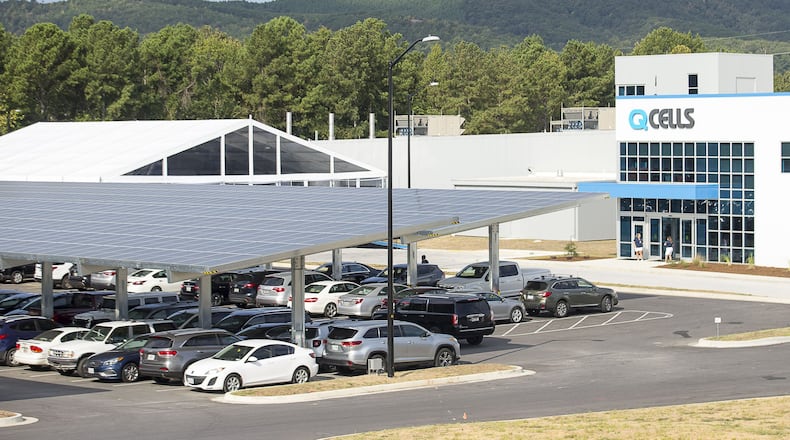The parent company of solar manufacturer Qcells confirmed Thursday that more solar panel production is headed to the “carpet capital of the world,” in the form of a new $171 million plant to be built near its existing Dalton facility.
The announcement follows a pledge earlier this month by South Korea-based Hanwha Solutions, which owns Qcells, to dramatically expand its U.S.-based solar production.
The new facility will produce 1.4 gigawatts of Qcells’ next generation, high efficiency solar panels each year and bring an estimated 470 new jobs to Whitfield County in Northwest Georgia, the company said in a release. Qcells’ existing Dalton facility employs more than 750.
Combined with the facility that’s already operating in Dalton, the new factory will allow Qcells to build 3.1 gigawatts worth of solar panels annually in the U.S., equal to one-third of the country’s total solar production capacity, the company said. The new factory is expected to open in the first half of 2023.
“Our additional investment in Dalton will help Qcells better serve the needs of U.S. customers with increased local manufacturing capacity,” Qcells CEO Justin Lee said in a release. “Georgia has become the clean energy manufacturing heart of America, and we are proud to contribute to the state’s advanced manufacturing economy.”
Thursday’s announcement earned bipartisan applause.
Gov. Brian Kemp also touted the investment and the “strong, prosperous relationship” that’s developed between Georgia and South Korea. Just last week, South Korean auto giant Hyundai Motor Group also confirmed plans to build a sprawling electric vehicle factory that will bring as many as 8,100 jobs to Bryan County near Savannah.
“We are proud that Qcells, like so many other job creators, has chosen to expand its operations here in the No. 1 state for business,” Kemp, a Republican, said in a release.
U.S. Sen. John Ossoff, D-Georgia, who met with Qcells representatives during a trip to South Korea last year, also praised the company’s decision to build its new factory in Georgia. Ossoff has also introduced legislation to boost tax credits available to domestic solar manufacturers, but the bill has yet to pass in the Senate.
“I will continue working to make Georgia a world leader in renewable energy innovation and manufacturing,” Ossoff said in a release.
Expanding the amount of electricity generated from the sun and other renewable energy sources is key to the global push to reduce greenhouse gas emissions and limit global warming.
However, the U.S. solar industry has faced major headaches lately from supply chain issues and an ongoing federal investigation into possible tariff dodging by Chinese solar manufacturers. Georgia Power recently announced that as a result of those issues, nearly 1,000 megawatts of its planned solar installations are now delayed by a year, slowing the company’s transition to renewable energy.
About the Author
Keep Reading
The Latest
Featured




